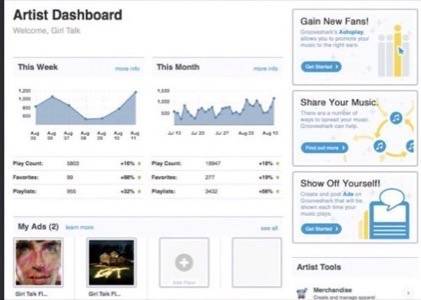Not to be outdone by recent announcements from streaming music site Spotify, Gainesville-based Grooveshark announced a $3 per month or $30 per year ad-free Grooveshark VIP service. Grooveshark VIP offers users early access to development pipeline releases including early testing on the upcoming Grooveshark iPhone application and early August 24th access to Grooveshark 2 – the site’s next generation. In addition to offering users WordPress and Facebook integration, Grooveshark spokesperson Josh Bonnain laid down some key differences between Spotify and Grooveshark.

Bonnain went on to explain that Grooveshark’s subscription services cost less than a quarter of Spotify’s monthly fees, and will offer many of the same features. For instance, both services stream ad-free music and both allow members to connect and discover premium content. Nevertheless Bonnain points out, “We’re in 231 countries, we’re web-based and our users can upload their entire catalogue to our site. Spotify requires users to install it on every machine they own and they’re only available in a few countries.”
Additionally, Bonnain went on to point out the Grooveshark artists community and quiet honestly, we were thrilled to discover it. Beyond the fantastic experience of the music discovery engine and the listener-focused features of the site, Grooveshark actually has a Bandcamp-style service for artists to promote themselves.

The Artist Dashboard allows bands to track their most popular songs, fan favorite play lists and measure play counts. Additionally, Grooveshark also allows bands to sell merchandise via Junkytees and TuniPop, license music via Creative Commons, land deals via YouLicense and crowdsource album funding via SellABand.
Within the artist’s environment, Grooveshark monetizes its service by offering musicians a chance to have their music advertised and played alongside similar bands. With more than 7 million tracks in its catalogue, the company is effectively leveraging its size and existing audience to make a case as the premier destination for artist promotion. Artists can expect to see their tracks in community playlists and distributed via widgets, links and soon, through mobile playlists.
While Spotify’s iPhone application has received a ton of buzz for its ability to play cached music streams, Grooveshark also has an iPhone application in the works. While the app’s current iteration does not allow for offline play, Bonnain assures ReadWriteWeb that the feature is in the mobile developer pipeline and it won’t cost $15 a month to try it when it arrives.
While both Grooveshark and Spotify’s premium subscription programs are in their infancy, it will be interesting to see which service will find the right features and licensing partnerships to come out on top.

















